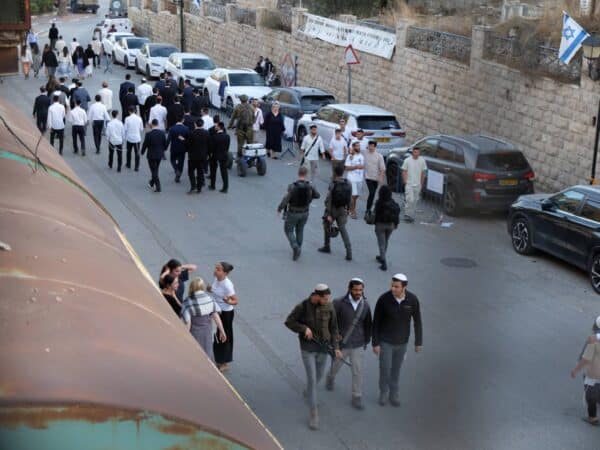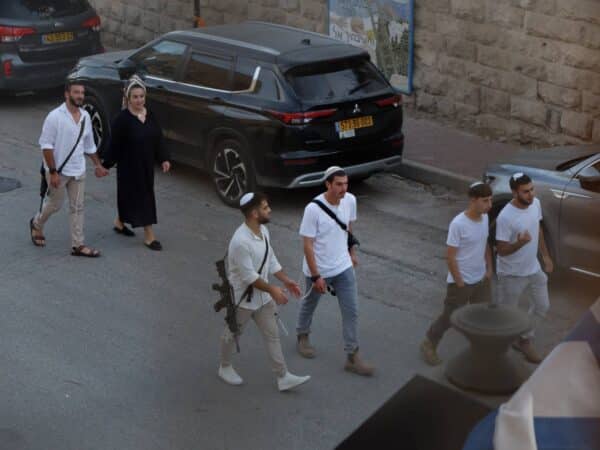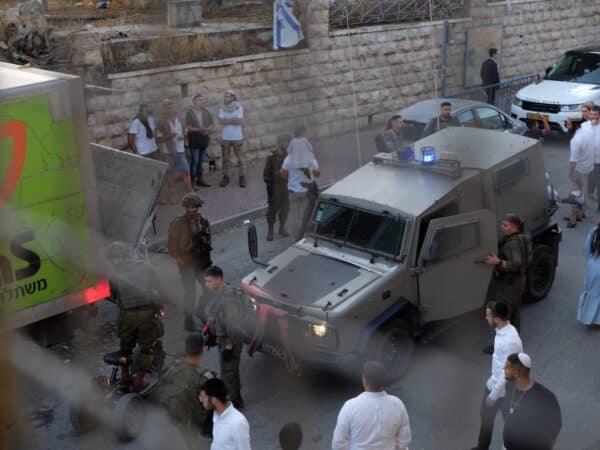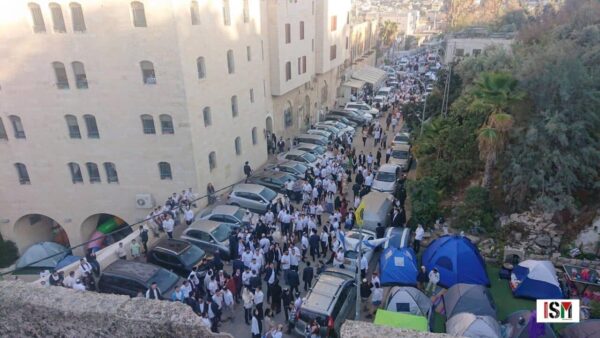The West Bank city of Al-Khalil, known as Hebron in Hebrew, is one of the oldest continuously inhabited cities in the world- and one of the most painfully divided. It is a place where the word occupation stops being abstract.
Above the ancient stone of the Old City, new concrete rises: Israeli settlements built directly atop Palestinian homes and shops. Wire mesh above the Old City’s streets is heavy with the weight of trash and waste thrown down by settlers, but provides little shelter from the boiling water they also sometimes dump. Meanwhile, the settlers’ walls are protected by cameras, barbed wire, and soldiers with rifles trained on the civilians below. For Palestinians, the occupation is not only political. It is gravitational.
In addition to ideological and religious lines, the city has been bureaucratically divided over the years by politicians as well. H1, nominally under Palestinian Authority control, holds most of the city’s 200,000 residents. H2, under full Israeli military control, is home to a few hundred settlers and around 30,000–35,000 Palestinian residents, in an area heavily garrisoned and tightly regulated. The two zones are painfully stitched together by checkpoints that regulate life more strictly than many international borders. Palestinians must navigate permits, closures, and arbitrary searches simply to cross their own streets. Settlers, meanwhile, come and go freely under the protection of the same soldiers who dutifully police their neighbors.
It is a two-tiered city, built on a two-tiered system. One law for settlers; another for the people who have lived here for centuries.
For some Israelis and foreign Jews, settlements across the West Bank represent an idyllic foothold in the Holy Land, drawing in families with promises of clean streets and good schools. But Hebron is a different story. With significantly more military presence and a lower quality of life, the settlers who choose to live here often do so for explicitly ideological reasons. Hebron is the city of Abraham, the patriarch revered by Jews, Christians, and Muslims alike- and, increasingly, it is the beating heart of Israel’s far-right religious nationalism.
Itamar Ben-Gvir, who resides in the nearby settlement of Kiryat Arba and whose Far-right Jewish Power party draws political energy from Hebron’s settler movement, is Israel’s current Minister of National Security. His recent political rise has brought the city’s hardline settler movement into the heart of Israeli government.
This ideological fervor is most visible in Al-Khalil on certain Zionist holidays, when the fragile rhythms of forced coexistence give way to something harsher. Streets close. Schools shut. Palestinian residents are confined to their homes while groups of settlers, escorted by heavily armed soldiers, march through the city chanting prayers- or insults. What should be a spiritual day becomes one of dread for the majority of Al-Khalil’s residents.
Among these holidays, one stands apart: Shabbat Chayei Sarah, or Sarah’s Day, a Sabbath dedicated to the biblical matriarch Sarah, wife of Abraham.
The Torah’s story goes that after Abraham agreed to sacrifice their son, Isaac, Sarah died of grief. Seeking a place to bury her, Abraham approached the Hittite elders of Al Khalil. They offered him his choice of tombs, free of charge. But Abraham insisted on paying full price, instead purchasing outright the Cave of Machpelah. That cave is believed to lie beneath what Jews call the Tomb of the Patriarchs and Muslims call the Ibrahimi Mosque, a site sacred to all three Abrahamic faiths.
It is also the epicenter of modern Hebron’s segregation. A holy site surrounded by internal border checkpoints with metal detectors and armed guards, where movement in and out for Muslim worshipers is controlled by occupation forces, who frequently deny access to those seeking to pray.
On paper, Chayei Sarah makes up a modest portion of the Torah – a few chapters read once a year in synagogues around the world. But in Al Khalil, it has become weaponized as a political pilgrimage. Thousands of Israeli settlers, joined by far-right activists, politicians, and rabbis, flood into the city for a weekend of festivities ostensibly meant to honor Sarah’s memory. Streets shut down, checkpoints multiply, and Palestinian residents are often left with no choice but to barricade themselves indoors, bracing for what has become a predictable cycle of disruption, entitlement and violence.



The logistics are staggering. Special convoys and buses arrive from across Israel. U.S.-based organizations sponsor and promote the pilgrimage, often framing it as a spiritual homecoming. This year, a Chicago branch of the ultra-Orthodox Chabad movement sponsored the festivities, with attendance packages selling for up to $2,000 per person. That fee included transportation, meals, “VIP access” and Sarah’s Day merchandise. Co-opting the language of faith, an ancient burial site has been rebranded into a premium experience.
The irony is stark: foreign donors financing a militarized religious carnival in a city where local Palestinian families cannot walk freely down their own streets. The message on the event posters – “You Own Hebron” – is not just a slogan: It is a threat disguised as theology.
When settlers arrive, under military escort, some may stick to prayers and songs. Others scrawl graffiti or break windows. Videos of these incidents circulate online each year, showing soldiers watching in silence or even laughing along. The videos rarely reach a global audience beyond Palestine. For Palestinians, there is little point in filing complaints; impunity for the perpetrators is as routine as the harassment itself.
It is difficult not to think of Sarah- the woman all this claims to celebrate. What would she make of this? Would she recognize her legacy in the chants of men claiming her as their matriarch while terrorizing other women in her name? Would she approve of the militarization of her memory, the checkpoints, the rifles, the walls cutting through the city where she and her husband were welcomed as honored guests?
Sarah’s story is one of deep faith and profound loss, but also of dignity. She was, by all accounts, a stranger in a foreign land- a woman whose kindness and perseverance helped shape a moral lineage that spans three of the world’s most influential religions. And yet, in Al-Khalil today, her name has been co-opted by those who see land not as a gift to be shared but as a conquest to be claimed. They do not honor Sarah’s legacy, they desecrate it.
During this year’s event, Israeli politicians used the occasion to promote their latest policy proposals, among them a push by Ben-Gvir’s party to allow the death penalty for Palestinians accused of “ideologically motivated” crimes, to even be applied retroactively. Meanwhile, Jewish extremists convicted of violence against Palestinians appear on talk shows, not in courtrooms. The asymmetry of justice mirrors the asymmetry of daily life in Al-Khalil; one people fenced in, the other protected by the fence.



And yet, beyond the politics and posturing there are small, quiet realities that reveal the true cost of this spectacle. A Palestinian child walking home from school the day before Chayei Sarah, knowing it will be her last day allowed outside this week. A father moving his family to the home of relatives in H1 to avoid the weekend unrest. Shopkeepers who lose their week’s earnings because soldiers have deemed their street “unsafe” for the visiting extremists. These are not abstract victims of geopolitics. They are Sarah’s spiritual descendants too- human beings deserving of the same reverence, protection, and peace that her story was meant to inspire.
We should mourn for Sarah – not just the woman of scripture, but the symbol she has become. Her name has been taken hostage by those who confuse possession with faith and dominance with devotion. We should mourn for the city that bears her memory, and for all the families living in the shadow of her tomb.
If Sarah’s story teaches us anything, it is that sacredness cannot coexist with cruelty. To truly honor her, we must reclaim her legacy from those who use it to justify violence. Sarah did not own Hebron. None of us do. The best we can do is live here- in this world, on this earth- with the steadfastness modeled so long ago by Sarah, and every day by the Palestinian women living on the land today.

